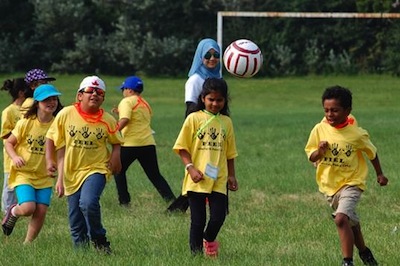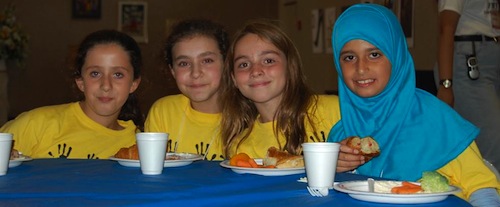(photo by Rebecca Zaidi)
Three years ago, Rabbi Audrey Pollack of SolelCongregation in Mississauga, Ont., decided to follow the lead of Rabbi DebraDressler of Temple Israel in London, Ont., and create an interfaith peace campin Mississauga.
Pollack, who hails from the United States, moved to Canada in 2015. The Reform congregation Solel “had a tremendous reputation in the movement in terms of the education,” said Pollack, as did “the rabbi of the congregation at the time, Rabbi Lawrence Englander, who retired after 40 years here.”
As for the idea of the camp, Pollack told the Independent, “When I spoke with Rabbi Dressler, it sounded like a great opportunity to bring together interfaith dialogue and cooperation. And so, I went out there that summer for the day to see what they were doing. I thought it was a great experience for kids, adults and the teen volunteers that we have.”
As the chair of the Interfaith Council of Peel, Pollack was well-positioned to start the interfaith camp, and Solel does a lot of outreach in the Mississauga community in general.
The suburb of Toronto “has about 700,000 people and we have about 250 families in our congregation, so we’re relatively small in terms of Jewish community here,” said Pollack. “We do a lot of dialogue and conversation with the community, because we are a diverse community. It’s important for people to know who Jews are and what we are about, to make friends and to really to support each other.”
Pollack wanted to find an Islamic partner who did a lot of English-language programs, as opposed to Arabic. They found Sheikh Jaffer H. Jaffer from the Masumeen Islamic Centre in Brampton, who was excited to join, said Pollack.
“The church – Canon Jennifer Reid from Saint Peter’s Anglican Erindale – we had already been partnering with for awhile,” she said. “I knew the minister there. They run a day camp program, like a vacation Bible study program. So, that was helpful our first year, just in terms of setting up and running a day camp. They already had a few people in place that had some background.”
At first, the interfaith camp’s content was a bit of mishmash, said Pollack, but it is continually being developed and updated to meet the needs of the community. One of the bigger challenges has been to maintain a balance from each denomination; the mosque membership is much larger than that of the church and synagogue.
“The first day, we always try to do something that everyone can do together, like a get-to-know-you day,” said Pollack. “Kids need to get to know each other as kids. We do a training beforehand for our adult and teen volunteers, and, I should mention that each faith centre makes a commitment to bring a certain number of volunteers.
“The first summer we did something on tzedakah, or charity, and this summer we did something on building friendship and peace.”
Each day of camp, they go to visit a different faith centre. The campers learn a little bit more about what each group believes and how they practise their beliefs. Everyone has an opportunity to visit, have a tour and ask questions.
“We really expect the youth from each of the faith centres to do some of that explanation,” said Pollack. “It’s an opportunity for them as well.
“I remember the first time we came here [to the synagogue] with the kids for summer. Our kids were so excited, because they’d been to the mosque the day before, and they wanted to give the tour and to explain what a Torah is, why we wear kippot and things like that. So, it’s an opportunity – not only for them to learn about other faiths, but for the home faith group to be proud of who they are … and to really make the connection that there are things we share in common, and that we need to get along with each other. Basically, we need to know our neighbours.”
Most of the participating kids go to public schools around the city and may sit next to each other in class, but they rarely get to share anything about their faith in class. They may have some misconceptions or stereotypes about what someone else’s faith or culture is, said Pollack, because they don’t really discuss it.

The camp is a great opportunity to share some truth and dispel such misconceptions, she said.
The kids who have had this camp experience are already looking forward to next summer, asking when registration will be open, said the rabbi. Their parents, too, are interested in what is going on.
“On the last night of camp – we’ve been running this as a four-day camp, maybe five next summer – we get together at one of the centres for a potluck meal,” said Pollack. “It is all-vegetarian, so everybody can eat. There’s a presentation and a slideshow. After the first dinner, all the parents said they wanted to go to camp and learn, so we started doing an adult session, too.
“We did a progressive dinner,” she said. “We started with appetizers at one centre, and then moved on to the next centre and had dinner. By the time they got here, at the synagogue, I could barely talk, because they were all chatting away with each other. And, it was great, because many of them, before this, didn’t know each other well.
“It was a really great day and we’re looking at doing some other programming this year. During the camp off-season, we’ll have an opportunity for dialogue and discussion, and some activities.”
With budget and space limitations, the camp is capped at 12 kids from each faith centre. While the campers pay to attend, the camp makes sure cost is not a prohibitive factor. “We want anyone who wants to, to be able to come, so we try to keep our costs low,” said Pollack.
The congregations are looking to create a couple more opportunities this coming year for people to meet, she said, “and they would like to do something for the older kids as well … to do an evening or afternoon activity where they could do a craft or cooking or something like that, and the adults could have a discussion on something that we have in common with each other.”

Because the Jewish community in Mississauga is small, said Pollack, “for our kids, when they come together at synagogue, it’s really important for them to connect with Jewish kids. For them, the opportunity to talk to their new friends from different religions and cultural backgrounds, with pride and support of each other, is important. It’s also really important for them to see that there are ideas and values and ethics that we hold in common. Often, we talk about what divides us.
“For younger kids, they just like hanging out with their new friends. They’ll talk about the activities they did together, while, for the older kids, they’ll articulate and express what they’ve learned or didn’t know before. Each time they go back, they gain something a little different.
“A very valuable part about this camp experience,” she continued, “is building relationships through intentional dialogue and intentional conversation, and the opportunity to do that in a camp setting means that people are doing it in different modalities. They are connecting with each other through play and through giving back to the community.
“One of the other things we’ve made part of our program each day, in addition to the activities we are doing, is giving back. We’ve invited representatives from the hospital to come and the kids have made cards for people in the hospital. We’ve invited people from our greening and planting area of the city to come also. So, they understand that, no matter what community you come from, there’s a value in supporting community.”
Rebeca Kuropatwa is a Winnipeg freelance writer.

